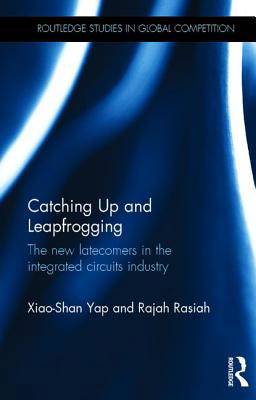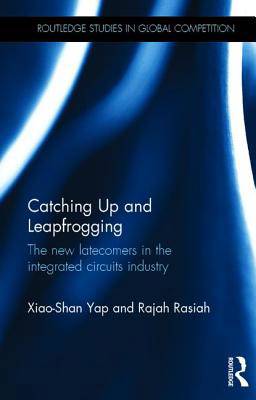
- Retrait gratuit dans votre magasin Club
- 7.000.000 titres dans notre catalogue
- Payer en toute sécurité
- Toujours un magasin près de chez vous
- Retrait gratuit dans votre magasin Club
- 7.000.0000 titres dans notre catalogue
- Payer en toute sécurité
- Toujours un magasin près de chez vous
Catching Up and Leapfrogging
The New Latecomers in the Integrated Circuits Industry
Xiao-Shan Yap, Rajah RasiahDescription
Ever since Schumpeter's groundbreaking work there has been a plethora of new research seeking to extend the direction and dynamics of innovation. Using a rich account of detailed interviews, this book offers new evidence on how latecomers have successfully caught up and leapfrogged incumbent firms.
Catching Up and Leapfrogging: the new latecomers in the integrated circuits industry explores how technological transitions affect latecomer catch-up strategies, and vice versa, in a high technology industry. It looks to the East Asian latecomers who, towards the end of the twentieth century, pioneered a new pathway through organizational change by specializing in the key production stages of integrated circuits and pushing technologies further. This volume assesses how latecomer resource acquisition strategies have varied alongside structural industry changes and evaluates the mechanisms through which firms started life as technology followers and rose to become technology leaders.
Xiao-Shan Yap and Rajah Rasiah present a unique story about how firm strategies evolve from the catching up phase to the leapfrogging phase, captured from the accounts of managers on the ground. It is the first time firm-level strategies have been systematically analysed to describe twenty-first century strategic management in the integrated circuits industry in particular, and the high tech industry in general.
The evidence and analysis in this book offers insights for chief executive officers, policy-makers and researchers to revisit existing approaches to the theory of catching up and leapfrogging.
Spécifications
Parties prenantes
- Auteur(s) :
- Editeur:
Contenu
- Nombre de pages :
- 170
- Langue:
- Anglais
- Collection :
Caractéristiques
- EAN:
- 9781138212787
- Date de parution :
- 02-12-16
- Format:
- Livre relié
- Format numérique:
- Genaaid
- Dimensions :
- 140 mm x 216 mm
- Poids :
- 344 g

Les avis
Nous publions uniquement les avis qui respectent les conditions requises. Consultez nos conditions pour les avis.






